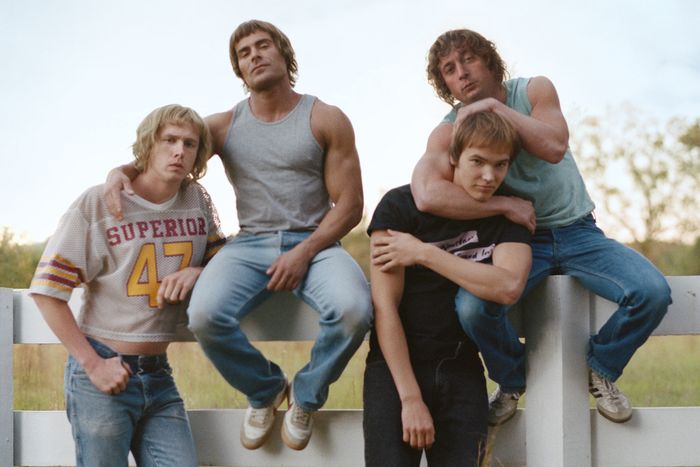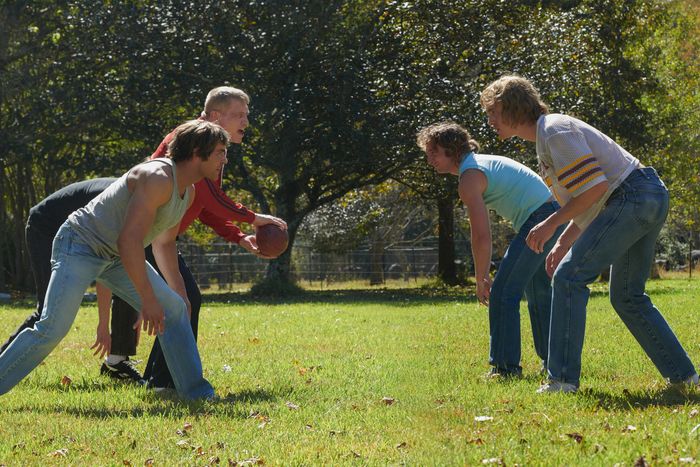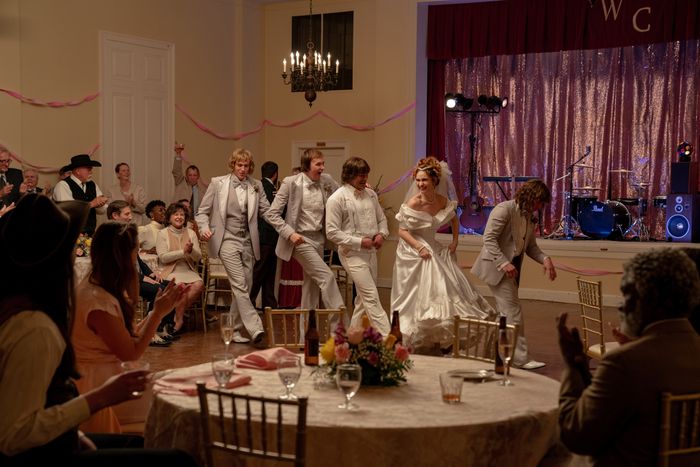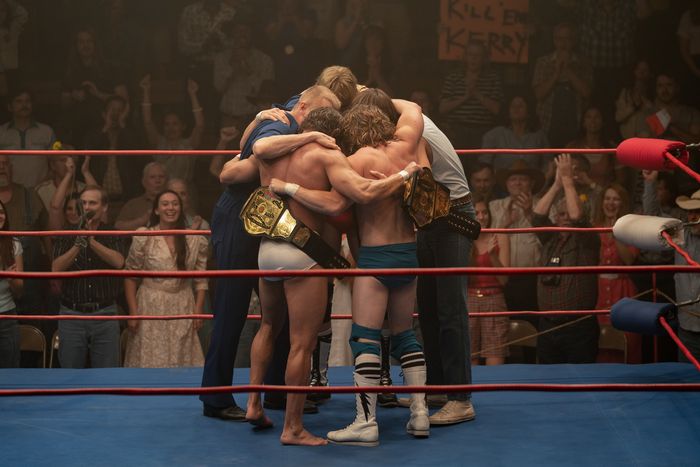
This piece was originally published on December 21, 2023. We are republishing it with The Iron Claw now streaming on Max.
Most biopics take creative liberties with the lives of their subjects, but the departures from reality in Sean Durkin’s pro-wrestler drama, The Iron Claw, are so numerous they’re worth a second look. The A24 awards contender tells the somber story of Texas wrestling’s most famous family, with the help of an impeccable ensemble led by Zac Efron, who plays in-ring superstar Kevin Von Erich.
Set during the wrestling boom of the 1980s, Durkin’s screenplay follows Kevin, three of his younger brothers, and their domineering father and trainer, Fritz (Holt McCallany), and mother Doris (Maura Tierney) as the family experiences a series of personal tragedies that play out like plot twists. The “Von Erich curse” comes up early on in The Iron Claw, referring to a dark series of events that followed former wrestler Fritz and his sons — all of whom except Kevin would be dead by 1993. Oldest brother Jack Jr., who exists in the film as a faded photograph, died at age 7, leaving Kevin, David (Harris Dickinson), Kerry (Jeremy Allen White), and their youngest sibling, Mike (Stanley Simons), to inherit their father’s wrestling legacy. But in real life, there were actually five Von Erich brothers who entered the ring. The youngest Von Erich, Chris, doesn’t exist in Durkin’s version of the story.
The Missing Von Erich
Durkin spoke to Vulture’s Chris Lee last week about how he arrived at the decision to omit Chris. Early versions of the script included the fifth Von Erich, but since Chris’s fate was so similar to two of his older brothers (he died by suicide, as did Kerry and Mike), Durkin felt that “the movie just couldn’t withstand another brother’s death.”
Still, it’s hard not to wonder about the ways Chris could have been included. The story circles the idea of “the curse” being a self-fulfilling prophecy thanks to Fritz’s ruthless drive to propel his sons to wrestling greatness. In that framework, Chris’s death in 1991 (after Mike’s, but before Kerry’s) might have reinforced not only the repetitive nature of these tragedies but just how little Fritz seemed to learn from the destructive effects of the way he raised his sons.
In the movie, Mike ends up taking Chris’s place as the sympathetic runt of the litter. Mike is presented as smaller than his older brothers, though in real life he was well built and stood six-feet-two, about the same height as Kevin and Kerry (David towered over them all at six-eight). Chris was the more diminutive one, standing at only five-five and prone to bone fractures as a result of his asthma medication. After Mike’s suicide in 1987 at age 23, the teenage Chris became depressed and developed an addiction to drugs. He died four years later from a self-inflicted gunshot at 21.
While Mike may not have necessarily wanted to become a wrestler — like in the movie, he had an affinity for the guitar and for inventing new kinds of wrestling camerawork — Chris’s frustrations stemmed, according to some, from a desire but physical inability to excel in the ring. In the Vice TV documentary series Dark Side of the Ring (in the episode about the family, titled “The Last of the Von Erichs”), referee and close friend of the family David Manning claims Chris found his brothers’ shoes “impossible to fill, based on his size.”
Durkin’s reasons for leaving out Chris aren’t hard to accept; at two hours and 12 minutes, the film can only fit in so much family tragedy. And the director does make an effort to transpose some of the real events surrounding Chris onto his older siblings.
Deaths on the Family Ranch
In the movie, the Von Erich curse culminates in 33-year-old Kerry’s suicide by gunshot on the family ranch, right outside the home he grew up in, with a gun that he had gifted to his father. In a heartbreaking moment, Kevin finds his brother just moments too late — and then Fritz suddenly appears, as if out of nowhere, and the two get into a scuffle. The events unfold somewhat awkwardly, perhaps because the scene mashes together two entirely different tragedies while leaving out potentially unflattering real-life details. It’s one of a few ways in which the film seems to sand down the Von Erich story’s more jagged edges.
Kerry really did mention his suicidal ideation to Kevin as recently as a few hours before pulling the trigger, like he does in the film. But The Iron Claw avoids touching on Kerry’s prolonged addiction to painkillers and multiple substance-related arrests, which seem to have compounded the circumstances leading to his death. (Kerry killed himself on the day he was scheduled to be indicted on drug charges.)
Instead, the film seems to combine elements of Kerry’s death with some of Chris’s. While Kerry did die by gunshot, Manning says he did so after embracing his father and telling him he loved him, before wandering into the woods and shooting himself in the heart. Chris also shot himself outside the family farm, right after a face-to-face conversation with Kevin, who pleaded and (at least temporarily) convinced him not to pull the trigger. Unfortunately, Kevin returned to the scene shortly thereafter to find his youngest sibling dying from a self-inflicted gunshot wound to the head.
Durkin depicts the emotional isolation that consumes Kevin after each death, and the ways in which he seems unable to process their loss. But the film can’t quite capture the full scope of the Von Erich curse’s ripple effects — in part because Chris is not the only one excised from the story.
The Cursed Von Erich Family Tree
A central through-line of The Iron Claw is Kevin’s marriage to Pam (Lily James) and his struggle to step up and help raise their two sons (the couple also had two daughters in real life). Kevin wasn’t the only Von Erich brother to get married and have children, though.
At the time of his death in Japan, David also had a wife, Trisha Matter, who doesn’t appear in the movie. A few years prior to David’s death, his first marriage to Candy McLeod fell apart after their baby daughter, Natosha, died due to sudden infant death syndrome at 13 weeks old. This and all other romantic aspects of David’s personal life remain absent from the film, leaving something of a dramatic void for Dickinson to overcome.
Mike was also married at the time of his death, to a woman named Shani Garza. Kerry was married too — to Catherine Murray, for about a decade, until they divorced a year before he died. He left behind two young daughters. One of them, Lacey, would eventually debut in the ring under the Von Erich name, the same as her younger cousins Marshall and Ross, Kevin’s sons.
The number of family tragedies only continues piling up the more you zoom out on the family tree. David, for instance, was named for Doris’s brother, who died of a brain tumor at age 14, only a few months before David was born. Durkin understandably wanted to avoid reaching so far and wide to portray the extent of the “curse.” The film does touch on the idea that the curse may be rooted in names to begin with — it’s for this reason that Kevin ensures his kids inherit his legal last name, Adkisson, rather than Von Erich. But it doesn’t get into the story of where the Von Erich family moniker came from.
The Von Erich Name’s Nazi Origins
When Kevin tells Pam that the Von Erich name was adopted from his maternal grandmother, he’s half right. Fritz’s mother’s maiden name was indeed Erich (rather than Von Erich), though curiously, Kevin doesn’t explain why Fritz — born Jack Adkisson — changed the family’s name in the first place. In reality, it was legendary wrestling trainer Stu Hart who suggested the name change to better fit Fritz’s wrestling gimmick: a Nazi officer.
Playing on the still-fresh memories of World War II, Fritz burst onto the scene in the 1950s as a nationalistic German “heel” (or villain) character. While the film portrays Fritz in his signature black trunks in its opening flashback, it makes sure to avoid depicting his ring jacket sporting an iron cross. That the movie avoids referencing this history is a little strange, especially since there were local superstitions about Fritz’s Nazi gimmick being the root cause of the family curse. In his book The Squared Circle, wrestling historian David Shoemaker writes that one of the most widely disseminated rumors about the family was that they were cursed by the ghost of a Holocaust victim who lost seven sons in the death camps. Per Shoemaker, this apparition “sincerely hoped nothing like that would happen to Fritz.” A fairy tale no doubt — the Von Erichs had no known ties to Nazism or white supremacy, and Fritz would eventually turn “babyface” (or hero) in his hometown. (In fact, the National Wrestling Alliance would bestow him with dozens of different title reigns, just not with the World Heavyweight Championship he covets in the film.) But this ominous detail clarifies just how large Fritz’s past loomed over the family’s image. Including it in the film could have been a compelling narrative addition to Kevin’s fears of his family’s past haunting him, his brothers, and his children.
The Fake Von Erich Brothers
In addition to Chris, there are actually two more Von Erich brothers who go unmentioned in the movie. One makes a brief, blink-and-you’ll-miss-it appearance, while the other is deleted entirely, but neither of their absences detract from the story.
That’s because they weren’t really Von Erichs. Rather, they followed the age-old wrestling tradition of presenting complete strangers as siblings (see also: Kane and The Undertaker). When Fritz was first starting out, he formed a tag team alongside Waldo Von Erich (real name: Walter Paul Sieber, a Canadian), his equally evil German brother, who would go on to have a lengthy solo career after Fritz’s retirement.
The other family “member” missing from the film is Lance Von Erich (real name: William Vaughan), a wrestler who was brought into an ongoing story line in the 1980s by Fritz, who billed Lance as Waldo’s son. After Mike’s injury, Lance was called in as a replacement over the objections of the rest of the family, as well as their many fans, who easily saw through the ruse of a sudden Von Erich cousin appearing out of nowhere.
These events aren’t covered by the film in detail, but Lance does appear in a single shot, shortly after Mike’s shoulder surgery. During a tag-team match, the camera remains focused on Kevin as he stands on the ring apron, waiting to be tagged in, while Lance — played by cocky All Elite Wrestling world champion Maxwell Jacob Friedman, an executive producer on the film — shows off inside the ring instead of letting Kevin participate.
None of this amounts to much more than comedic rigamarole and so was left out of the film. The Iron Claw is, after all, a rigorous drama about horrifying events. But some of the most upsetting chapters of the immediate family’s story were also unduly left out.
The Fates of Jack Jr. and Sr.
When the Von Erich curse first comes up in the movie, Kevin explains that his older brother, Jack Jr., died at age 7, but he doesn’t expand on how this happened. In the film’s fiction, it makes sense that Kevin wouldn’t bring this up to Pam on a first date; it’s already an uncomfortable scene, with Kevin seemingly unaccustomed to casual conversation. But Fritz’s disposition and motivations could be partially explained by Jack Jr.’s death; according to the real Kevin (in Dark Side of the Ring), the passing of his firstborn led Fritz to become more aggressive and erratic.
One winter when the Von Erichs were still living in a trailer, Jack Jr. was playing outside and came into contact with an electrified trailer tongue (which connects a trailer to a moving vehicle). The shock sent him facedown into a puddle of melting snow, where he drowned. Knowledge of these details might make Fritz’s introductory conversation with Doris feel half-baked. They discuss moving out of their trailer and into a house, and Fritz mentions that “bad things” have happened to their family, though he never specifies what. The conversation seems to be entirely focused on money and championship glory rather than on any past tragedy.
In his final days, a few years after Kerry’s death, the real Fritz ended up with brain cancer and had a confrontation with his last surviving son. As Kevin describes it in Dark Side of the Ring, Fritz, in his foggy condition, pointed a gun at Kevin and told him, “You’d kill yourself too if you had the guts.”
An earlier cut of the film may have included a line that expressed the same sentiment, with Fritz telling Kevin he should’ve died instead after they discover Kerry’s body. (I spoke to a test audience member who screened the film in May and recalls the line drawing shocked gasps from the audience.) In the version released to theaters, however, father and son come to blows after only a few words. Fritz is never given a moment to ruminate on the fact that he’s outlived all but one of his sons, and that it might even be his fault.
Given the specific scenes and events The Iron Claw ignores, it’s hard not to wonder if either a longer movie (or perhaps a miniseries) may have better captured the full extent of these horrors and their impact on the Von Erich clan. Instead, what we’re left with is an occasionally effective version that draws from a CliffsNotes understanding of the Von Erich curse and how tragic it truly was.





